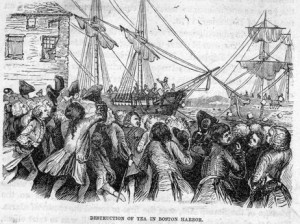 I would generally agree with this pretty fair article by NPR, Today’s Tea Party Isn’t Quite Like 1773′s. The current Tea Party movement is not protesting the lack of representation like their 1773 counterparts who had no representation at all. Current protestors indeed are not happy with those who are representing them and in a lot of cases this crosses party lines. The current movement is anti-big government, anti-spending, and anti-establishment. Though there are some cross currents in comparison, I agree each has to be understood within the context of the times. In the article, Jill Lepore, a history professor at Harvard University who has an interesting book about to come out, The Whites of Their Eyes: The Tea Party’s Revolution and the Battle over American History, makes several observations that I do agree with for the most part. However, when Lepore says, “What most people know about the American Revolution, they learned in elementary school,” I scratch my head as that clearly is not the case. Some may have an elementary level of understanding and there are all kinds of reasons for that.
I would generally agree with this pretty fair article by NPR, Today’s Tea Party Isn’t Quite Like 1773′s. The current Tea Party movement is not protesting the lack of representation like their 1773 counterparts who had no representation at all. Current protestors indeed are not happy with those who are representing them and in a lot of cases this crosses party lines. The current movement is anti-big government, anti-spending, and anti-establishment. Though there are some cross currents in comparison, I agree each has to be understood within the context of the times. In the article, Jill Lepore, a history professor at Harvard University who has an interesting book about to come out, The Whites of Their Eyes: The Tea Party’s Revolution and the Battle over American History, makes several observations that I do agree with for the most part. However, when Lepore says, “What most people know about the American Revolution, they learned in elementary school,” I scratch my head as that clearly is not the case. Some may have an elementary level of understanding and there are all kinds of reasons for that.
Americans “want to look to a common past.” But the idea of a unified-in-purpose nation, she says, “has its origins in 19th-century romantic nationalism.” She encourages her students and others to wrestle with the true meanings of the American Revolution. This questioning of what the tea parties — present and past — are all about “is an important part of our political debate.” And so the arguments rage on.
And as we have discussed before and as other websites do on a daily basis, the battleground of history is the use and abuse of it. And indeed the arguments will “rage on” atleast through the November election season.
American Revolution historian Jack Rakove made what I thought was the best observation:
The Tea Act of 1773 that sparked the Boston Tea Party, Rakove says, was born of the crown’s collusion with corporate Britain — the East India Trading Co. So if Tea Partiers are up in arms over the American government being in cahoots with the corporate world — say, over the Obama administration’s handling of the Troubled Assets Relief Program that bailed out many faltering financial institutions — the present-day dismay would have legitimate roots in the ire of yesteryear. “That wouldn’t be implausible,” Rakove says.
That is where the current movement could make some key important historical comparisons.
The point of the NPR piece is, I believe, is a distraction from the bigger picture. The 1773 Tea Party is, in popular memory, about liberty and freedom and resisting an unjust government. The same is true of the modern TP movement. In that way, it is VERY MUCH like the “1773′s”. I’m a bit more concerned about the Marxist(s) in the White House & Congress than I am every day citizens perhaps not getting their symbolism “exactly” right when it comes to the Tea Party. Of course, NPR has skin in the game, so you would expect them to be more critical of the TP movement than of their shrinking teat.